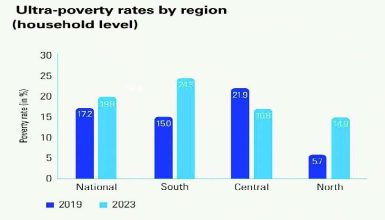EIU sees mounting Pressure on fiscus
Treasury’s aspirations to restore debt sustainability in the short-term hangs in the balance following unplanned expenditures that government ought to address in the 2022/23 financial year, Economist Intelligence Unit (EIU) has warned.
This financial year, Treasury indicated that the fiscal plan is anchored on a realistic revenue estimate and a rationalisation of expenditure, while protecting essential spending, to achieve a fiscal adjustment of about one and half percentage points of the gross domestic product (GDP) in the 2023/24 financial year.
But the EIU, a firm within the Economist Group which provides forecasting and advisory services, says government expenditure will be high in 2023/24, owing to perennially elevate social safety nets.
Reads the firm’s report: “High spending on social transfers and the reconstruction of infrastructure occasioned by Cyclone Freddy will lead to policy slippages on the staff monitored programme, keeping the public expenditure or GDP ratio elevated in 2023/24.”
The firm, in its fiscal policy outlook for Malawi, also observed that the country faces a large domestic interest repayment in the current financial year of about 5.9 percent of GDP which will in turn keep public spending high.

It said: “Furthermore, the Reserve Bank of Malawi’s (RBM) protracted negative net foreign asset position is a potential source of increased capital transfer from the government to re-capitalize the central bank, as required by law.”
The EIU, however, projects that the public expenditure to GDP ratio will fall steadily in 2024/25 and 2027/28 fiscal years owing to fiscal austerity measures required under the International Monetary Fund (IMF) Extended Credit Facility (ECF), including the removal of subsidies and improvements in spending efficiency.
The country has recently passed first test as the global lender has reached a staff-level agreement on the second and last review of the Staff Monitored Programme with Executive Board Involvement.
The agreement is, however, subject to IMF management and executive board approval and receipt of the necessary financing assurances.
To help the country attain a debt sustainability status, RBM is engaging bilateral creditors on debt restructuring agreements
In a published statement recently, RBM Governor Wilson Banda indicated that debt restructuring agreements with creditors such as African Export and Import Bank (Afreximbank) and Trade and Development Bank (TDB) could help the country save $700 million (about K766 billion) in debt repayment during the moratorium period.
He said the agreements RBM and government are seeking from Afreximbank and TDB, formerly PTA Bank, are moratoriums to extend loan repayment periods without further interests.
Borrowing by a government is deemed to be sustainable when it is below 50 percent of GDP, comprising domestic borrowing of not beyond 20 percent of the gross domestic product (GDP) and external borrowing not exceeding 30 percent of the broadest measure of economic activity.
However, Malawi’s public debt stands at K7.9 trillion representing 69.93 percent of GDP pegged at K12 trillion.





